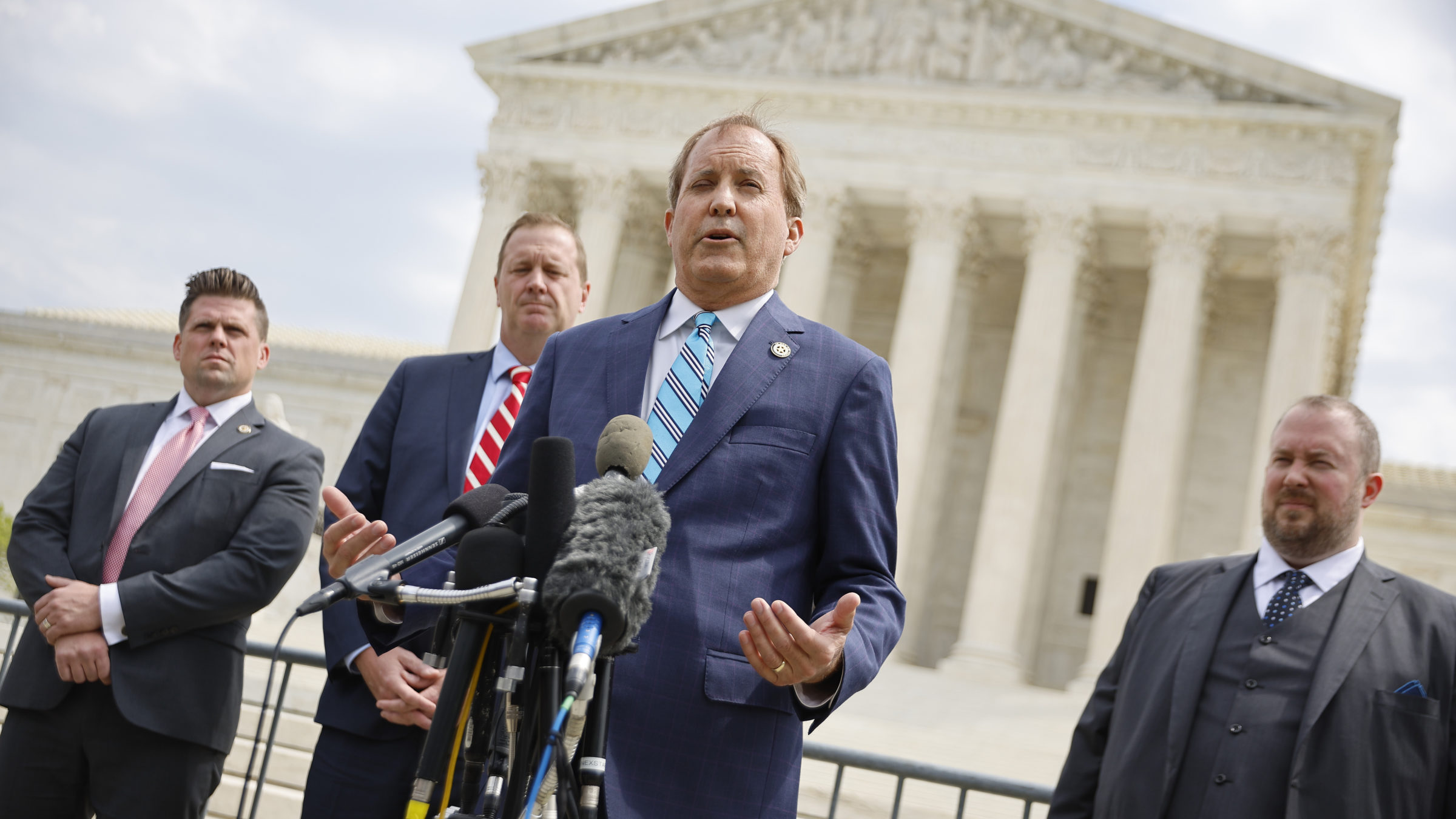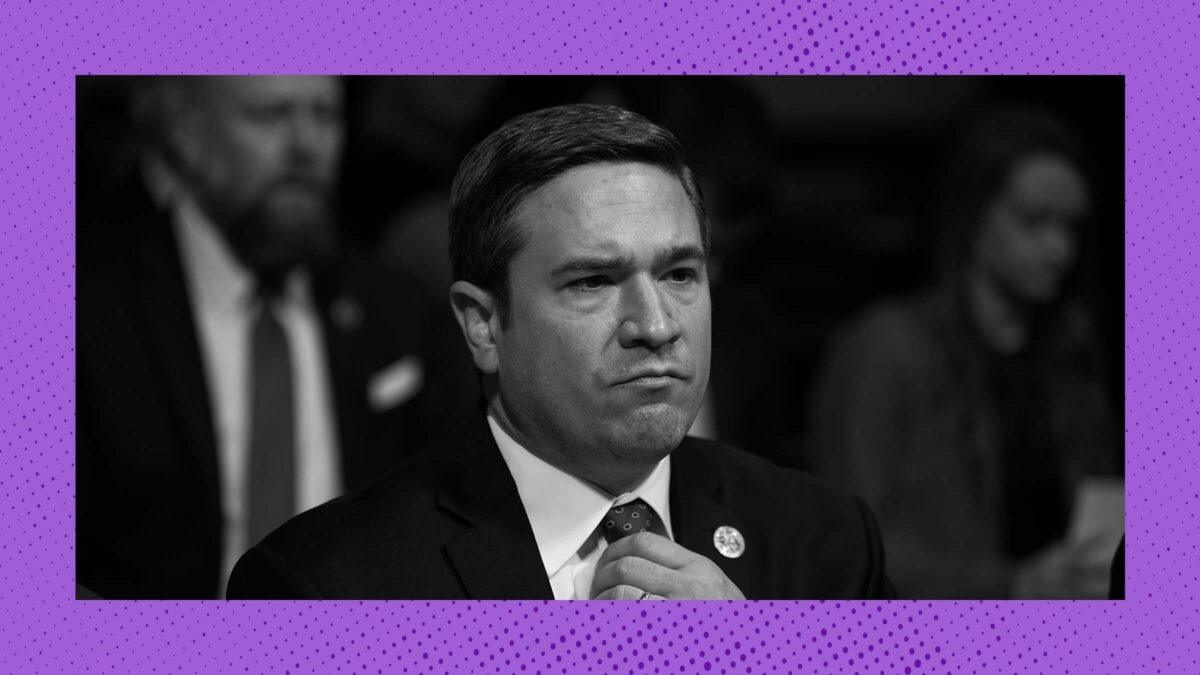Andrew Bailey wants to talk to the manager.
Bailey, Missouri’s Republican attorney general, is very mad that a Manhattan jury convicted Donald Trump on 34 counts of falsifying business records to hide his hush money payments. The ones he paid so voters wouldn’t know he cheated on his pregnant wife.
So, as one does when one is upset, Bailey went straight to the U.S. Supreme Court. On July 3, he asked the justices for leave to file a complaint against the State of New York. He had, his motion explained with Oliver Twistian pathos, “just one modest request: temporarily stay any gag order and sentence imposed by the State of New York against Donald Trump.”
All the Missouri Attorney General wanted for the Fourth of July was for the U.S. Supreme Court to discard every principle of standing, propriety, procedure, and state sovereignty to interfere, for the first time in history, with a politically inconvenient local prosecution happening a thousand miles from Missouri.
Other than for laughs—and Supreme Court litigation has given us so many moments of joy over the past few weeks!—Bailey’s suit is interesting not in its own right, or for anything new it reveals about Bailey, but for what it says about conservative grievance-mongers’ codependent relationship with litigation and the Court. Increasingly, going straight to the Court is a kind of therapy—a reactionary cri de coeur that restores a sense of order and significance, soothing emotional hurt in a confusing world. You don’t go to the manager because of the slow service. You go because you are important.

Montana AG Austin Knudsen, Oklahoma AG Gentner Drummond, Missouri AG Andrew Bailey and law professor Frank Bowman III arrive to testify regarding House Republicans’ efforts to impeach Secretary of Homeland Security Alejandro Mayorkas, January 2024 (Photo by Kent Nishimura/Getty Images)
The Supreme Court’s original jurisdiction, recall, extends to “controversies between two or more States.” Bailey’s theory is that Missouri has a legal dispute with New York, where his preferred presidential candidate was prosecuted and convicted. Even though it was Alvin Bragg, an independently elected local district attorney, who prosecuted Trump—and Juan Merchan, a state court judge, who will sentence him—Bailey worries that the threat of sentencing and Merchan’s gag order interfere with Missourians’ sacred right to hear Trump spew unfiltered malice.
It’s a silly case, of course. The best part of reading the filings is trying to deduce, from the titles of linked webpages, what exactly Donald Trump’s soft-focus “bookkeeping offense” might have been. Bailey certainly doesn’t say. The name “Stormy Daniels” does not appear.
Smarter people than I think Missouri has no shot at prevailing, even if this Court has a record of treating Trump real special. For one thing, the same Court that’s been relentlessly shrinking its regular docket isn’t going to invite a flood of suits from states who don’t like how their peers are doing internal business. For another, Bailey’s complaint came exactly a week after six justices told him, in response to a different preposterous bit of right-wing activist litigation, that the state of Missouri can’t sue over a violation of someone else’s First Amendment rights. The same basic principle applies here: Trump, not Andrew Bailey, is the person to complain about wrongs purportedly done to Trump, and he of all people doesn’t need any help airing grievances.
Bailey is a true believer who likes the national stage—he’s one of the three Republican AGs, for instance, to intervene in the mifepristone litigation before Trump judge Matthew Kacsmaryk in Amarillo, Texas. (A city that, like Manhattan, is not in Missouri.) But he’s not really an outlier. Recently, red states have started going straight to the Supreme Court to litigate imagined harms that someone else did to someone else, competing to be the most beautiful victim on the biggest possible pageant stage.
The trend was jumpstarted back in 2020, when Texas Attorney General Ken Paxton tried to file a U.S. Supreme Court original action complaining about how four swing states (which all went for President Joe Biden) tallied their votes in that year’s election. But Texas doesn’t get a veto over Pennsylvania’s internal balloting procedures, and Paxton’s political loyalties—he wanted Trump to win—don’t mean that he’s legally injured when another state insists on accurately counting all the votes. The alternative is a Supreme Court battle royale among fifty attorneys general every time a state’s local rules affect national politics, directly or indirectly.
Mercifully, and pragmatically, seven justices refused to let Texas file the complaint, citing lack of standing. Justices Samuel Alito and Clarence Thomas, meanwhile, would have at least docketed the complaint. They argued that the Court’s original jurisdiction is non-discretionary, no matter how meritless the substance might be.
Paxton didn’t learn from the experience. In 2021, for instance, he was back on the Supreme Court’s original jurisdiction docket, complaining about California refusing to spend its own money sending its employees to states that discriminate against LGBTQ people. Again, the Supreme Court wasn’t biting: There is, one wishes it were needless to say, no right to force another state to subsidize travel to your state. Texas doesn’t have anything to say about California’s bank account, any more than it controls Pennsylvania’s ballot boxes. Paxton may feel a deep sense of insult stemming from California’s (correct, here) symbolic assertion of moral superiority, but that doesn’t get you into court.

Texas AG Ken Paxton, flanked by Missouri AG Eric Schmitt and Texas Solicitor General Judd Stone, speaks to reporters about their challenge to Biden administration immigration policies, April 2022 (Photo by Chip Somodevilla/Getty Images)
The trend continues, though. Just a month ago, a coalition of 19 red states ran to the Supreme Court to sue six blue states over consumer protection lawsuits that the blue states had filed (each on their own, in their own states’ courts, invoking state law causes of action) against Exxon Mobil. They insist that the suits will have knock-on effects in their states: If California recovers billions to compensate for Exxon’s long-term campaign of marketing fossil fuels while lying about climate change, the prices may go up at Alabama pumps. But that logic, again, would open the door to Supreme Court litigation any time a state does something affecting the national economy. Exxon is the actual object of the consumer protection suits, and it can afford its own lawyers.
Maybe red states really do think they’ve found the One Weird Trick for litigation success. Jumping the line to history’s friendliest Supreme Court would be nice for them. But the tactic hasn’t yet proven successful. So this doesn’t feel like law as power politics, or even as messaging politics. Losing repeatedly isn’t really great messaging.
Instead, this is litigation as a mechanism of psychological projection, identification, and therapy. The way you heal injuries is by lashing out, and the place to do it is the Supreme Court, where all meaning begins and ends. Going straight to the Court is like proposing in the place where you and your soon-to-be first met. (Lawsuits, to stretch a metaphor, are their love language. Moving to leave to file a bill of complaint is how you tell Donald Trump—or that heartthrob Exxon Mobil—that you’re head over heels.) The conservative legal movement built the Court. Into it, the movement poured its cruelty, its malice, and its will to dominate all life. The two are inextricably bound; they need each other, not just instrumentally but emotionally.
Even if Bailey and his cohort don’t believe their own (frivolous, maybe sanctionable) legal arguments, I don’t think their claims of grievance are inauthentic. They’re deeply felt. This is the final avatar of the conservative commitment to cultivating victimhood. It’s always about them, every slight, every time. And they need the Court to know about it, the way kids run to their parents when they skin their knees.
Everything that matters to them—emotional hurt, political loss—has to go through the Court. That’s how they know that things matter, and that they matter. Now the Supreme Court isn’t just the country’s most important, and most unaccountable, seat of power and lawmaking. It’s also become the conservative grievance movement’s primary locus of meaning-making.






